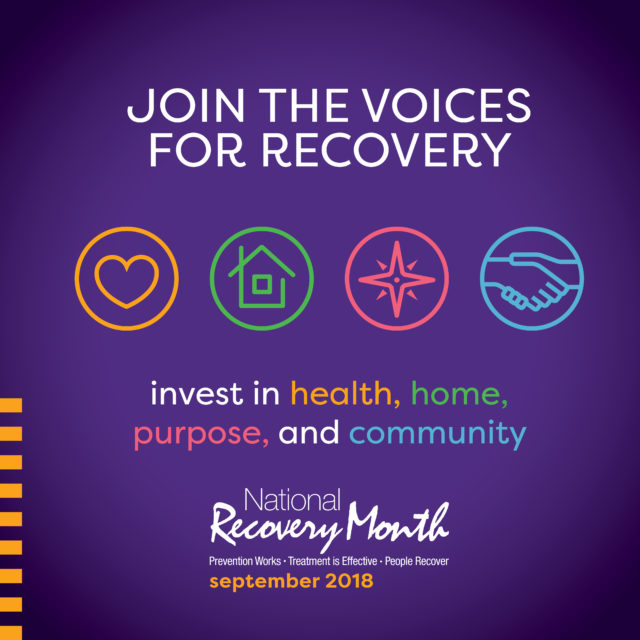
September is National Recovery Month and Lund is proud to join in this initiative to raise awareness and share the successes of treatment and recovery. National Recovery Month, a project of the Substance Abuse and Mental Health Services Administration, is in its 29th year.
This year’s theme is “Join the Voices for Recovery: Invest in Health, Home, Purpose, and Community,”.
From the SAMHSA website:
“This theme explores how integrated care, a strong community, sense of purpose, and leadership contributes to effective treatments that sustain the recovery of persons with mental and substance use disorders.”
Below you will find information about how Lund’s programs provide treatment and support recovery in each of the four domains identified in SAMHSA’s explanation of the focus of National Recovery Month 2018.
Integrated care – Lund’s treatment and family support programs address the multiple challenges a family might be facing, rather than only treating one issue in isolation. At Lund, parents can engage in treatment for substance use and/or mental health disorders while also accessing parenting education, high school completion, workforce development, developmental screenings for children, medical care and more. Their care is managed and coordinated by a team whose members regularly communicate to ensure that the clients and their children are receiving the correct care and to assess whether their treatment plans should be modified to address changing needs or goals. This approach removes multiple barriers to engaging in all the needed services and leads to better long term outcomes for the whole family.
Strong community – So much of Lund’s work is based on forming strong community – with moms and children at Lund’s residential facility, with families living at the Independence Place transitional housing program, with pregnant and parenting students at New Horizons Educational Program, with women recently discharged from the residential program through the alumni group. Having a community around you to provide support, friendship, love and hope is essential to maintain strength in recovery. In the broader sense too, Lund works hard to create a compassionate and strong community amongst staff members working in different geographical locations and in different programs. As a long serving organization, Lund strives to be an active part of Vermont’s nonprofit community to strengthen our work, and to help combat stigma or misconceptions around parenting in recovery.
Sense of purpose – Lund recognizes that treatment for substance use and mental health disorders extends beyond clinical interventions. It also includes helping clients to formulates goals and plans for themselves and their families; to discover and refine their own sense of purpose. For Lund clients, their sense of purpose might come from working towards their high school diploma at New Horizons, gaining on the job training through the workforce development program, working with case managers to enroll in college classes, find a job, secure housing, or find childcare in the community of their choice as they move towards discharge from the residential program. Children often provide the primary sense of purpose that keeps parents motivated. Lund can help clients articulate the hopes and dreams that they have for their families and take purposeful steps towards making those dreams come true.
Leadership – Many Lund clients have spent years not being seen, not being heard, and with no one valuing their opinions or contributions. Lund provides opportunities for clients to be visible, to be validated, and to take on leadership roles. Being a leader takes courage and a commitment to holding yourself accountable. Leaders must practice compassion and forgiveness towards others and towards themselves. All of these traits also aid recovery. The residential program has a peer council that is comprised of clients who emerge as leaders and embody the values of the community. They are often able to give peers valuable feedback and insight into challenges they are experiencing and help hold others accountable to the expectations of the residential program. Peer Council members solicit feedback from peers about their experience in the program and work alongside staff to make positive change. They also take on extra responsibilities and projects based on where they see a need – like keeping the vans clean, or doing a community “green up” day. Peer Council is essential to the health of our community; it provides clients with an opportunity for leadership, encourages peers to lean on each other for support and guidance, and allows clients to take part in shaping and improving our program.
Lund’s prevention and outreach program also provides leadership opportunities by offering clients the chance to share their stories of unintended pregnancy, young parenthood, and addiction with classes of middle and high school students. They share things that they wish they had known when they were younger. Publicly sharing their stories takes immense courage and willingness to be extremely vulnerable. Again both admirable qualities of good leaders.

